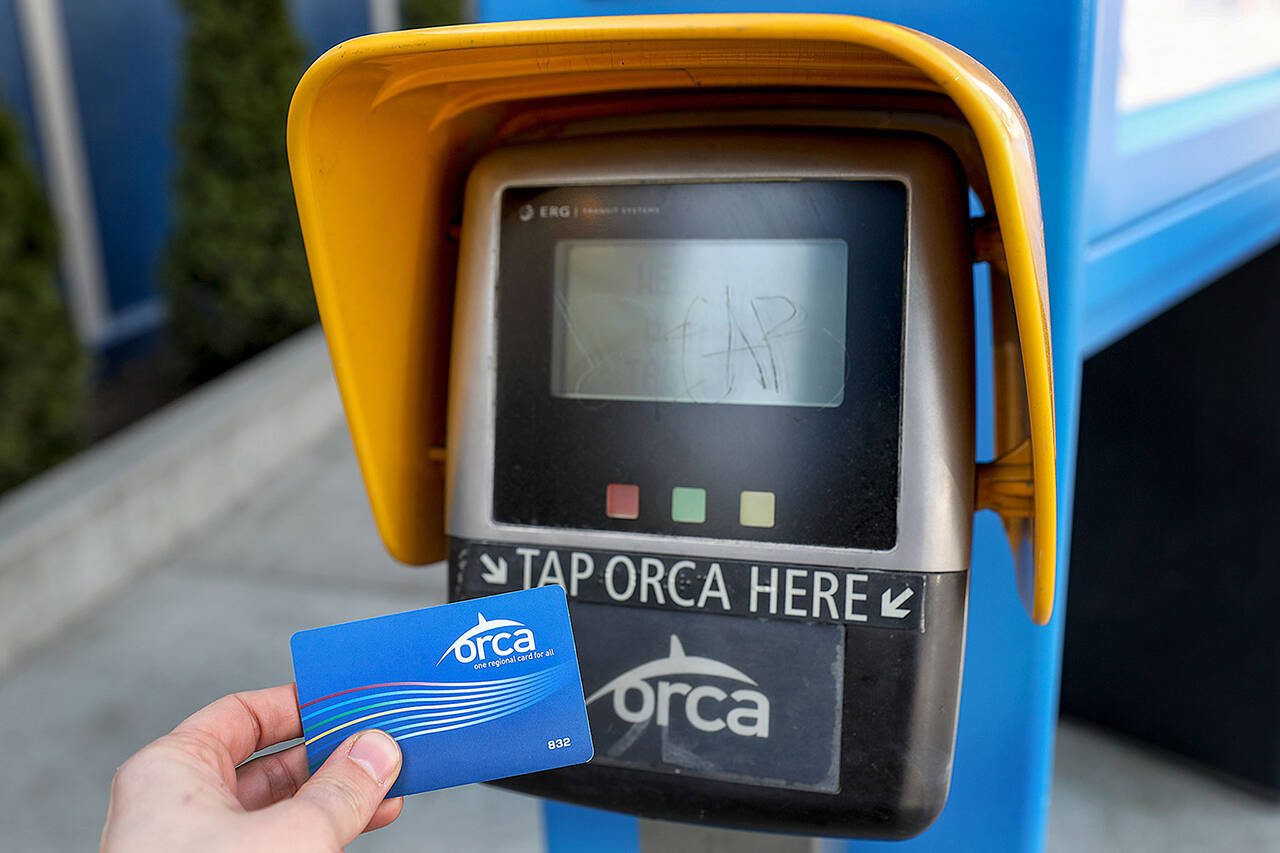OLYMPIA — After attorneys gave their formal arguments Thursday morning in the state Supreme Court, justices could decide the fate of fare enforcement on public buses and trains.
At question: Is the act of inspecting a transit rider’s fare an invasion of a person’s right to privacy?
In this case, that person is Zachery Meredith, 37, who boarded a Community Transit Swift bus headed to Everett almost four years ago. When asked, he acted as if he had fare, but couldn’t find proof. He was arrested and eventually convicted by a jury for giving a Snohomish County sheriff’s deputy a fake name.
He reportedly said he was “Jason McGumery,” from Colorado, but deputies learned his real identity after fingerprinting him. One deputy advised him on the correct spelling of Montgomery, according to court documents.
Meredith has fought the gross misdemeanor through Everett District Court, Snohomish County Superior Court, the state Court of Appeals and finally the state Supreme Court.
Fare at the time cost $2.25.
Justices will submit their opinion at a later date. What they asked Thursday may hint at their approach. They may consider a number of questions.
The most important: Was Meredith seized?
Attorney Tobin Klusty said he was, the moment an armed, uniformed sheriff’s deputy asked him for proof of payment.
“In that moment, no reasonable person would feel that they could decline that command or refuse to answer,” Klusty said.
Such a seizure would be unconstitutional, Klusty said, because the deputy had not developed probable cause or a reasonable suspicion to stop him.
If justices side with Klusty, it could have far-reaching impacts on the way fare enforcement is conducted on public transit. It would be impossible to tell whether a passenger has paid fare by just looking at them. Even meeting the low bar of a reasonable suspicion would be unfeasible.
Agencies would have to rethink “barrier-free transit,” like the Swift line or King County Metro’s RapidRide buses, where riders can pay at the station instead of on the bus. Technically, no one will stop people from getting on if they don’t pay, so transit authorities rely on fare enforcement to ensure payments.
The barrier-free method is faster, less costly and more efficient, transit authorities say.
Representing the state, Snohomish County deputy prosecutor Nathaniel Sugg contended the act of asking for fare doesn’t constitute a seizure. If it was a seizure, he said, riders consent to it when they step on a public bus or train. He argued any reasonable person who boards should expect someone might ask for proof of payment. It’s a “minimal intrusion” that should qualify as a rare exception for the need of suspicion or probable cause, he said.
Who is a “reasonable person?” asked Justice Sheryl McCloud. She said there might be a difference in expectation depending on the person.
“When I’m asked for proof of fare, maybe I don’t necessarily feel seized,” McCloud said. “When a person of color is confronted by law enforcement and is asked for proof of anything, in an enclosed space, of a bus or train, maybe they do feel seized.”
Sugg suggested the court’s analysis “should properly include all people of color and of all experiences.”
A rider survey done by Sound Transit found Black passengers were disproportionately targeted by fare enforcement. Another study by King County Metro looked at the prevalent economic disparities of fare enforcement.
Justice Mary Yu asked Sugg whether there’s a difference between being asked for proof of payment by an unarmed transit employee or an armed law enforcement officer.
“There could be a difference in intimidating presence between law enforcement officers and non-law enforcement officer fare enforcers,” Sugg said.
In this case, Klusty said, because it was clear the sheriff’s deputy was law enforcement, the court didn’t have to consider whether an unarmed transit employee’s fare check amounted to a seizure.
That means justices could effectively decide fare checks can still happen, just not by law enforcement officers.
Potentially, justices also could scratch out the statute granting transit authorities the power to carry out fare checks, in the same way they did away with the crime of simple drug possession in the Blake decision last year.
Klusty said justices didn’t necessarily have to go that far. The statute could stay intact, he said, but the role of law enforcement should be limited.
Zachariah Bryan:
Talk to us
> Give us your news tips.
> Send us a letter to the editor.
> More Herald contact information.

























